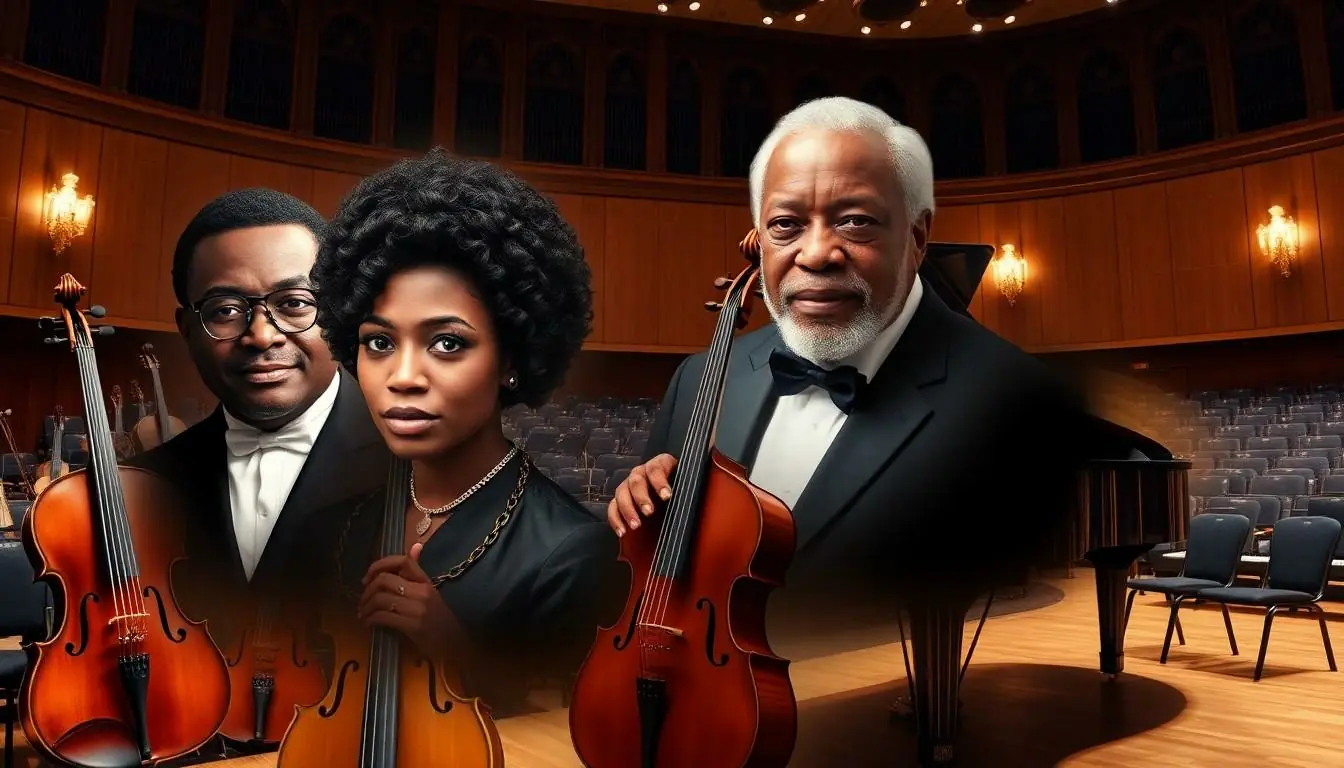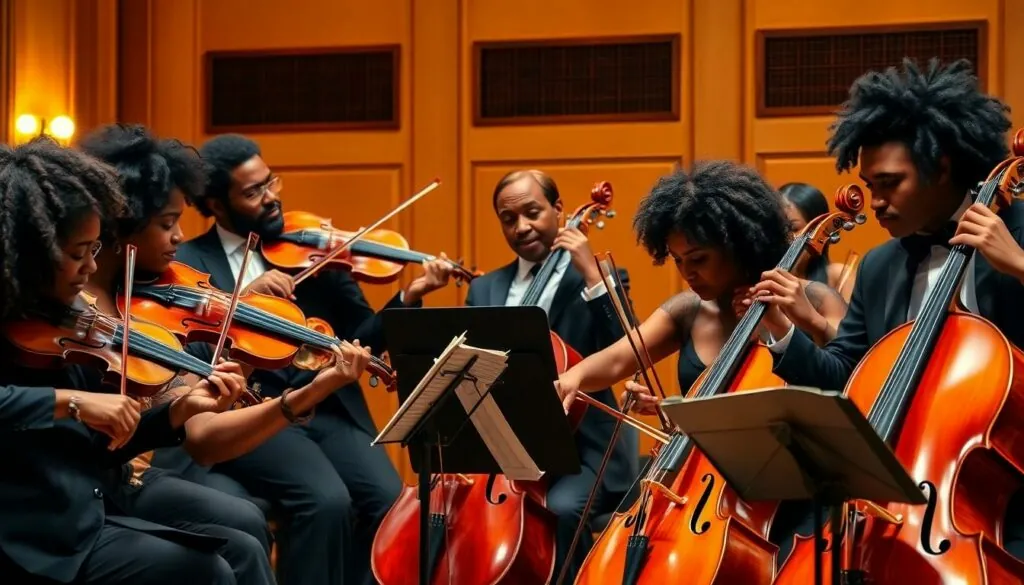Table of Contents
ToggleWhen you think of classical music, names like Beethoven and Mozart might come to mind, but what if we told you there’s a rich tapestry of black classical musicians waiting to be discovered? This genre is not just about powdered wigs and orchestras; it’s a vibrant celebration of culture, innovation, and creativity that deserves the spotlight.
Understanding Black Classical Music
Black classical music encompasses a rich array of contributions that shape the genre’s development. Understanding its significance requires examining historical contexts and key influences.
Historical Context
The 19th century marked the emergence of prominent black composers, such as Samuel Coleridge-Taylor and Florence Price. These individuals challenged prevailing stereotypes about race and artistry in classical music. The legacy of the African Diaspora contributed to the evolution of classical styles, blending traditional African elements with European musical frameworks. During the Harlem Renaissance, black musicians gained recognition, highlighting their integral role in classical music’s narrative. Institutions began to acknowledge their contributions, although significant barriers remained. Scholars and performers continue to explore these historical aspects, enriching the understanding of classical music’s diverse fabric.
Key Influences
Several factors influenced the contributions of black musicians to classical music. The African oral tradition provided a foundation for storytelling and rhythmic complexity. Spirituals served as a profound source of inspiration, reflecting deep cultural roots and experiences. The integration of jazz elements introduced a distinct flavor, merging improvisation with structured composition. Further, mentorship from established musicians helped nurture talent. This blend fostered innovation, allowing new voices to emerge. Modern composers and performers draw upon these influences, resonating with audiences today. Their works celebrate heritage while pushing boundaries within the classical genre.
Notable Composers

Numerous black composers have significantly enriched classical music, shaping its evolution and expanding its boundaries. These musicians capture complex cultural narratives, bringing unique perspectives to their compositions.
Early Pioneers
Samuel Coleridge-Taylor emerged as a critical figure in the late 19th century, drawing inspiration from African musical traditions. He gained recognition for works like Hiawatha’s Wedding Feast, which showcased rich orchestration and thematic depth. Florence Price, the first African-American woman to have a symphony performed by a major orchestra, fused folk elements with classical styles. She composed over 300 works, including symphonies and chamber music, establishing a legacy that continues to influence today’s musicians.
Contemporary Voices
Modern composers like George Walker and Jessie Montgomery reflect the evolving landscape of black classical music. Walker, the first African American to win the Pulitzer Prize in Music in 1946, explored themes of identity and heritage in pieces such as Lilacs. Montgomery incorporates elements of her cultural background into her compositions, emphasizing community and social themes. Composers today continue to innovate, blending classical foundations with diverse influences, thus enriching the genre with their personal stories and experiences.
Musical Characteristics
Black classical music exhibits distinct musical characteristics that reflect diverse cultural influences and innovative styles. These attributes have enriched the classical genre significantly.
Unique Styles
Innovative rhythms and melodic structures define unique styles in black classical music. Composers often incorporate elements from African musical traditions, emphasizing polyrhythms and call-and-response patterns. Moreover, the use of syncopation energizes compositions, creating a lively interplay of sounds. Some artists draw from spirituals and folk songs, blending them seamlessly with classical forms. Others, like Florence Price, juxtapose classical techniques with jazz elements, adding improvisational flair. Through these unique styles, black classical music challenges conventions, forging new creative pathways.
Instrumentation
Instrumentation plays a vital role in the uniqueness of black classical music. Composers frequently use traditional orchestral instruments like strings, woodwinds, and brass, but they also explore unconventional choices. Examples include the incorporation of percussion instruments from African heritage, which add depth and complexity. This fusion creates textural richness, transforming the auditory experience. In works by George Walker, the human voice serves as a powerful instrument, delivering profound emotional resonance. Each choice in instrumentation reflects the cultural narrative and personal experiences of the composers, enhancing the overall impact of their music.
Cultural Impact
Black classical music significantly influences cultural discussions and artistic expression today. Its evolution reflects the rich tapestry of experiences and challenges faced by black musicians.
Representation in Modern Media
Media representation shapes perceptions of black classical musicians. Films, documentaries, and digital platforms increasingly highlight their contributions. Recent productions showcase the works of composers like Florence Price, renewing interest in their legacies. Television performances feature the work of contemporary artists, bringing innovative styles to diverse audiences. Streaming services also curate playlists dedicated to black classical music, enhancing visibility. Such exposure invites broader appreciation and understanding, connecting new listeners with the deeper narratives behind the compositions.
Contributions to Classical Music
Black composers enrich classical music through distinct innovation and creativity. The 19th-century emergence of figures like Samuel Coleridge-Taylor and Florence Price challenged artistic boundaries. Coleridge-Taylor’s fusion of African themes with orchestral traditions transformed the classical landscape. Price’s orchestral works often combine elements of folk traditions, introducing fresh perspectives. Contemporary composers such as George Walker and Jessie Montgomery continue this legacy, exploring themes of identity and community. By blending diverse influences, these musicians offer vital contributions that expand the genre’s scope and depth.
The contributions of black classical musicians have profoundly enriched the genre, challenging preconceived notions and expanding its boundaries. By drawing from diverse cultural influences and personal narratives, these composers have created a dynamic and innovative body of work that deserves recognition and celebration.
As the landscape of classical music continues to evolve, the voices of black musicians will play an essential role in shaping its future. Their unique perspectives and artistic expressions not only enhance the genre but also foster a deeper understanding of its cultural significance. Embracing this rich heritage ensures that classical music remains a vibrant and inclusive art form for generations to come.





